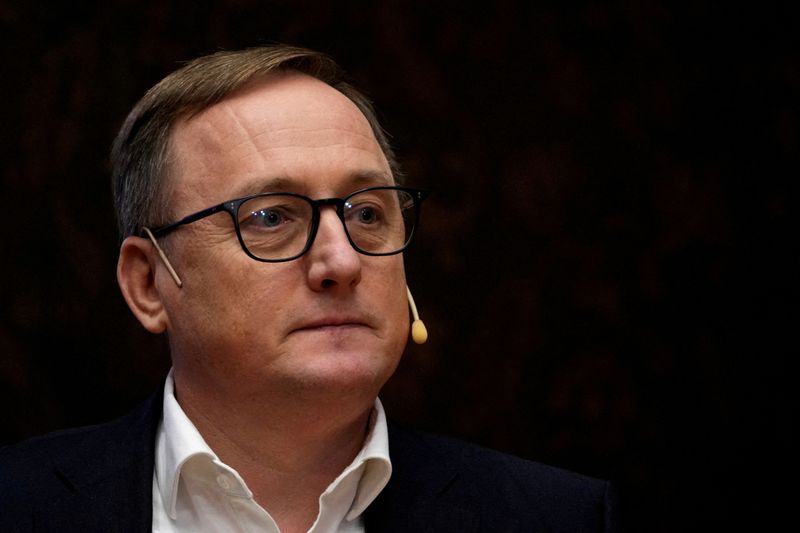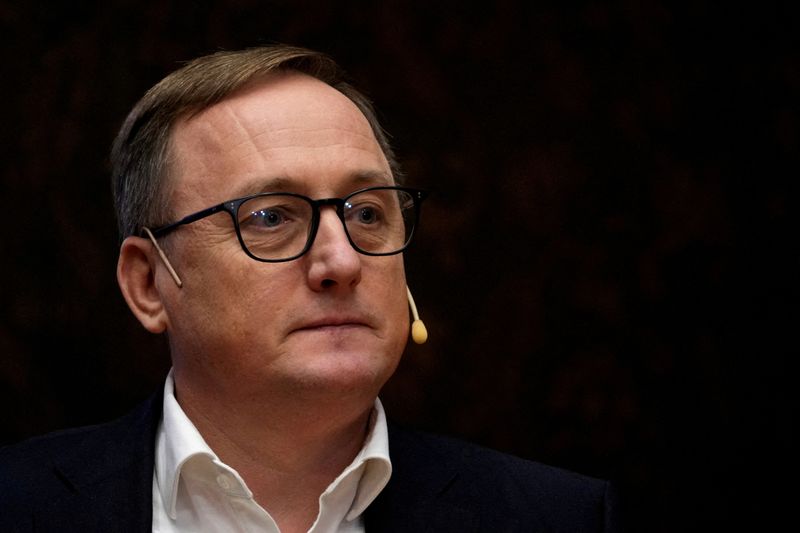Economy
ECB should discuss early end to bond buying scheme: Kazaks


© Reuters. FILE PHOTO: Latvian central bank governor Martins Kazaks attends the bank’s macroeconomic forecast presentation in Riga, Latvia September 23, 2022. REUTERS/Ints Kalnins/File Photo
By Balazs Koranyi
MARRAKECH (Reuters) – The European Central Bank should discuss tweaks to a key bond buying scheme and weigh higher charges for commercial banks, Latvian policymaker Martins Kazaks said on Wednesday, arguing a recent rise in borrowing costs, including for Italy, was not worrisome.
Some investors were spooked by market volatility in recent weeks that pushed up the premium Italy must pay to borrow, and said the turbulence was a lesson for the ECB to stick with a scheme that forms a key plank in fighting off unexpected yield rises.
But Kazaks said the move was merely a reflection of Italy’s widening budget deficit and this should not stop the ECB from debating an early end to its reinvestments in the 1.7 trillion euro ($1.8 trillion) Pandemic Emergency Purchase Programme (PEPP).
“With regard to Italy, at least at the current stage, I don’t see anything that worries me about an impairment in the transmission mechanism or something that I would consider an unwarranted market reaction,” Kazaks told Reuters.
The ECB uses reinvestments in the PEPP scheme with a degree of flexibility, skewing purchases towards more indebted countries when warranted in what some policymakers call the bank’s first line of defence.
The ECB is set to reinvest all proceeds from the scheme until the end of 2024 but some have called for an earlier end, given that the bank has been tightening policy to fight inflation.
“I would say that we would gain credibility by adjusting instruments and explaining this, rather than sticking to an instrument for too long,” Kazaks said. “Do I think it’s necessary or possible to end reinvestments earlier than the end of next year? My answer would be yes.”
However, any further reduction in excess liquidity should be gradual and predictable, so changes to PEPP should not be abrupt, he argued.
Kazaks also said the ECB should revisit increasing the mandatory reserve requirement for commercial banks, which would force lenders to park more cash at the central bank with no interest.
Policymakers considered this option over the summer and decided against it, but some hope the issue would come back when the ECB reviews its broader operational framework early next year.
“This is an instrument that has been used in the past regularly,” Kazaks said. “There is a case to be discussed … I think a larger multiple would be a discussion point.”
But Kazaks played down the prospects of further interest rate hikes, arguing that communication at the ECB should now shift to the duration of high rates from further increases.
“I think interest rate levels are quite appropriate for us to get back to 2% inflation in the second half of 2025,” he said. “But I cannot shut the door to a further rate increase sometimes down the road.”
($1 = 0.9423 euros)
Economy
Russian central bank says it needs months to make sure CPI falling before rate cuts -RBC


© Reuters. Russian Central Bank Governor Elvira Nabiullina attends a news conference in Moscow, Russia June 14, 2019. REUTERS/Shamil Zhumatov/File Photo
MOSCOW (Reuters) – Russia’s central bank will need two to three months to make sure that inflation is steadily declining before taking any decision on interest rate cuts, the bank’s governor Elvira Nabiullina told RBC media on Sunday.
The central bank raised its key interest rate by 100 basis points to 16% earlier in December, hiking for the fifth consecutive meeting in response to stubborn inflation, and suggested that its tightening cycle was nearly over.
Nabiullina said it was not yet clear when exactly the regulator would start cutting rates, however.
“We really need to make sure that inflation is steadily decreasing, that these are not one-off factors that can affect the rate of price growth in a particular month,” she said.
Nabiullina said the bank was taking into account a wide range of indicators but primarily those that “characterize the stability of inflation”.
“This will take two or three months or more – it depends on how much the wide range of indicators that characterize sustainable inflation declines,” she said.
The bank will next convene to set its benchmark rate on Feb. 16.
The governor also said the bank should have started monetary policy tightening earlier than in July, when it embarked on the rate-hiking cycle.
Economy
China identifies second set of projects in $140 billion spending plan


© Reuters. FILE PHOTO: Workers walk past an under-construction area with completed office towers in the background, in Shenzhen’s Qianhai new district, Guangdong province, China August 25, 2023. REUTERS/David Kirton/File Photo
SHANGHAI (Reuters) – China’s top planning body said on Saturday it had identified a second batch of public investment projects, including flood control and disaster relief programmes, under a bond issuance and investment plan announced in October to boost the economy.
With the latest tranche, China has now earmarked more than 800 billion yuan of its 1 trillion yuan ($140 billion) in additional government bond issuance in the fourth quarter, as it focuses on fiscal steps to shore up the flagging economy.
The National Development and Reform Commission (NDRC) said in a statement on Saturday it had identified 9,600 projects with planned investment of more than 560 billion yuan.
China’s economy, the world’s second largest, is struggling to regain its footing post-COVID-19 as policymakers grapple with tepid consumer demand, weak exports, falling foreign investment and a deepening real estate crisis.
The 1 trillion yuan in additional bond issuance will widen China’s 2023 budget deficit ratio to around 3.8 percent from 3 percent, the state-run Xinhua news agency has said.
“Construction of the projects will improve China’s flood control system, emergency response mechanism and disaster relief capabilities, and better protect people’s lives and property, so it is very significant,” the NDRC said.
The agency said it will coordinate with other government bodies to make sure that funds are allocated speedily for investment and that high standards of quality are maintained in project construction.
($1 = 7.1315 renminbi)
Economy
Russian central bank says it needs months to make sure CPI falling before rate cuts -RBC


© Reuters. Russian Central Bank Governor Elvira Nabiullina attends a news conference in Moscow, Russia June 14, 2019. REUTERS/Shamil Zhumatov/File Photo
MOSCOW (Reuters) – Russia’s central bank will need two to three months to make sure that inflation is steadily declining before taking any decision on interest rate cuts, the bank’s governor Elvira Nabiullina told RBC media on Sunday.
The central bank raised its key interest rate by 100 basis points to 16% earlier in December, hiking for the fifth consecutive meeting in response to stubborn inflation, and suggested that its tightening cycle was nearly over.
Nabiullina said it was not yet clear when exactly the regulator would start cutting rates, however.
“We really need to make sure that inflation is steadily decreasing, that these are not one-off factors that can affect the rate of price growth in a particular month,” she said.
Nabiullina said the bank was taking into account a wide range of indicators but primarily those that “characterize the stability of inflation”.
“This will take two or three months or more – it depends on how much the wide range of indicators that characterize sustainable inflation declines,” she said.
The bank will next convene to set its benchmark rate on Feb. 16.
The governor also said the bank should have started monetary policy tightening earlier than in July, when it embarked on the rate-hiking cycle.

 Forex3 years ago
Forex3 years agoForex Today: the dollar is gaining strength amid gloomy sentiment at the start of the Fed’s week

 Forex3 years ago
Forex3 years agoUnbiased review of Pocket Option broker

 Forex3 years ago
Forex3 years agoDollar to pound sterling exchange rate today: Pound plummeted to its lowest since 1985

 Forex3 years ago
Forex3 years agoHow is the Australian dollar doing today?

 Cryptocurrency3 years ago
Cryptocurrency3 years agoWhat happened in the crypto market – current events today

 World3 years ago
World3 years agoWhy are modern video games an art form?

 Commodities3 years ago
Commodities3 years agoCopper continues to fall in price on expectations of lower demand in China

 Economy3 years ago
Economy3 years agoCrude oil tankers double in price due to EU anti-Russian sanctions



























